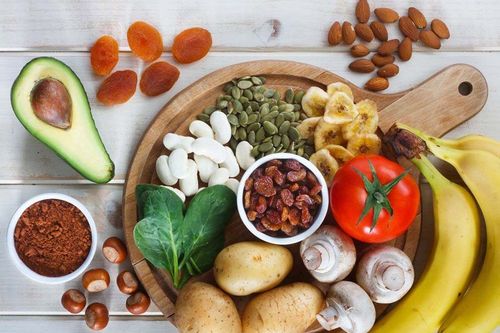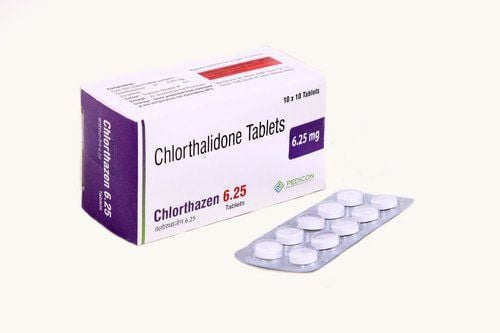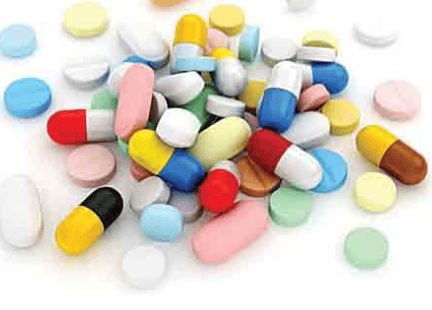This is an automatically translated article.
Supplementing children with potassium-rich foods can help keep blood pressure within healthy limits, reduce the risk of kidney stones, and reduce osteoporosis. However, there are also some potential dangers associated with consuming too little potassium (hypokalemia) and too much potassium (hyperkalemia) that parents should be aware of.
1. Why is potassium important?
Potassium is one of the electrolytes that are very necessary for the human body in general and children in particular. Potassium combines with sodium to control the water balance in the child's body, helping to maintain a stable blood pressure reading. In fact, a diet low in potassium and too high in sodium may be one of the risk factors for hypertension. Potassium also contributes to the maintenance of muscle function and heart rhythm regulation. In the long term, keeping potassium and blood sodium levels in balance can reduce the risk of kidney stones and osteoporosis.
The American Dietetic Association has identified potassium as one of the nutrients that school-age children are most deficient in.
Potassium is very important for the body. But too much potassium in the blood can be harmful. When your baby's kidneys aren't fully developed and working properly, too much potassium can cause them to build up in the blood. Children's bodies get potassium mainly from the food they eat. Some children may have difficulty maintaining normal blood potassium levels. Such children may need to limit or avoid foods high in potassium.
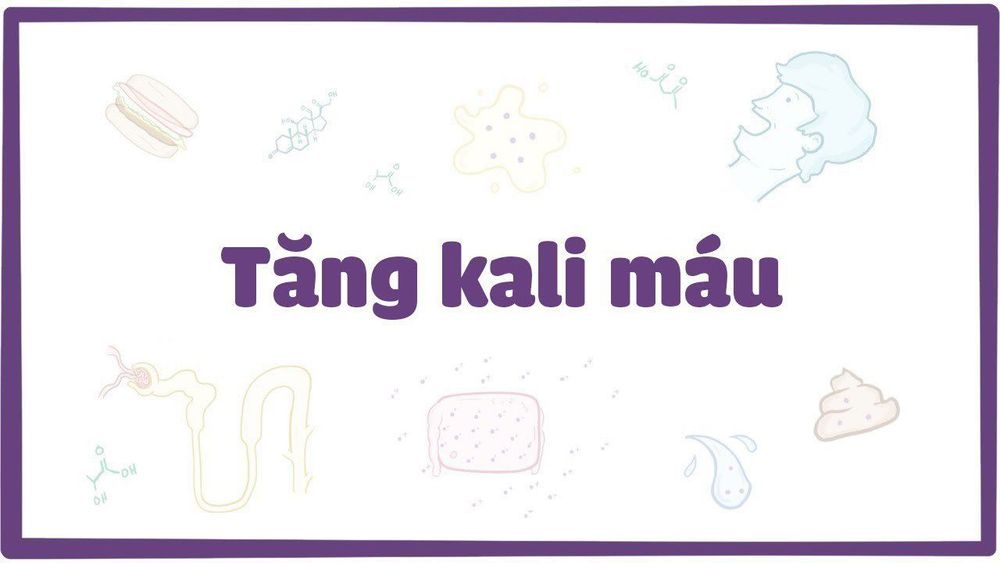
Tăng kali trong máu có thể gây hại
2. How much potassium does your child need?
As recommended by nutritionists, a child's potassium needs depend on many factors, the most important of which is the age of the child:
Children from 1 to 3 years old need about 3,000 mg per day Children from 4 up to 8 years old need about 3,800 mg per day. However, children do not need to get the recommended daily amount of potassium. Instead they can be accumulated in average units of a few days or a week at the discretion of the parents.
3. Good source of potassium
Most foods contain a certain amount of potassium. It is important to avoid or limit foods high in potassium in case your baby has kidney problems or if his blood potassium level is too high. Some foods rich in potassium include: Bananas, oranges, potatoes, orange juice, sweet potatoes, grapefruit juice, tomato sauce, cantaloupe... The list below will guide parents in getting Choose the right food for your child based on the potassium content of the food. Note that most fruits, juices, and vegetables are high in potassium, especially when eaten directly.
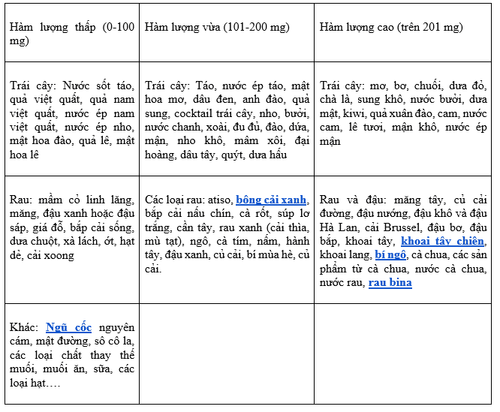
Mothers can reduce the potassium content of certain foods such as potatoes and green vegetables by following these instructions:
Peel and cut potatoes Vegetables soaked in hot water in 2 hours or soak in cold water overnight Drain and rinse vegetables thoroughly in warm water Pour water just cover vegetables, boil for 5 minutes and simmer until cooked Drain drain and prepare (boiled, sauteed or mashed) for children to eat. Fresh fruits and vegetables are excellent sources of potassium. Milk, meat, and cereals also contain potassium, but babies don't absorb them easily from these sources. In addition, the experts also provided a specific list of foods with corresponding potassium content as follows:
1/2 medium baked potato: 463 mg 1/2 cup of prune juice: 352 mg 1/4 can of prunes: 318 mg 1/4 can of raisins: 299 mg 1/2 cup tomato juice: 278 mg 1/4 cup white beans: 251 mg

Các loại hạt có nguy cơ gây nghẹt thở cho trẻ nhỏ nên cần hết sức cẩn thận
1/2 cup orange juice: 248 mg 1/4 cup lima beans: 242 mg 30g sunflower seeds: 241 mg 1/4 cup pumpkin: 224 mg 1/2 medium banana: 211 mg 1/4 cup vegetable soup cooked spinach: 210 mg 1/2 cup cantaloupe: 208 mg 30g almonds: 200 mg 1/2 medium tomato: 146 mg 1/2 cup bran cereal with raisins: 181 mg 1/2 medium orange : 118 mg 1/4 cup honey: 97 mg 1/2 watermelon: 85 mg The amount of potassium will vary slightly depending on the size of the fruit and the brand of the product. Note that some foods (such as dried fruit and nuts) pose a choking hazard for young children, so extreme care should be taken in feeding them. Children may also eat more or less than the recommended amount, depending on their age and taste. Parents should consider to estimate the nutritional content accordingly.
4. Is the child getting too much potassium?

Mất cân bằng nồng độ kali trong cơ thể dẫn tới mệt mỏi
In fact, children can get too much potassium without their parents even knowing it, although this is unlikely. Nutritionists do not determine the recommended amount of potassium for children or the maximum amount of calories that is considered safe for children to take in each day. It is important for the body to maintain a good potassium balance. Too much potassium can cause potassium to build up in the blood. While a low potassium diet or potassium loss due to vomiting or diarrhea can cause hypokalemia.
The side effects of imbalanced potassium levels in the body include fatigue, muscle weakness, easy cramps, gastrointestinal problems or even heart rhythm instability.
While many different parenting foods and magazines emphasize the importance of balanced baby meals that include vitamins and nutrients, one of which is often overlooked, is potassium. Although most healthy children have adequate amounts of potassium in their bodies, this only happens if they are guaranteed to eat healthy foods. Potassium deficiency in children can lead to many diseases and health conditions common in adults such as high blood pressure, cardiovascular disease, weight gain and depression. Therefore, parents need to ensure that they always provide the child with the necessary amount of potassium.
In addition to potassium and a scientific diet, during this period children also need to be supplemented with lysine, essential micro-minerals and vitamins such as zinc, chromium, selenium, and B vitamins to help fully meet their nutritional needs. nutrients, support digestion, enhance absorption of nutrients, help improve anorexia, help children eat well. Children in the period from 6 months to 3 years old are very susceptible to respiratory problems, respiratory infections, skin diseases and gastrointestinal infections... parents need to pay special attention to the care and provision of adequate nutrition for children. The pediatric department at Vinmec International General Hospital is the address for receiving and examining diseases that infants and young children are susceptible to: viral fever, bacterial fever, otitis media, pneumonia in children. ,... With a system of modern facilities, medical equipment, sterile space, minimizing the impact as well as the risk of disease spread.
For more nutritional knowledge and child care for each age, parents should regularly visit the website vimec.com and make an appointment with the leading doctors, pediatric and nutrition experts of the National General Hospital. Vinmec when needing advice on children's health.
References: babycenter.com, stanfordchildrens.org, superhealthykids.com





